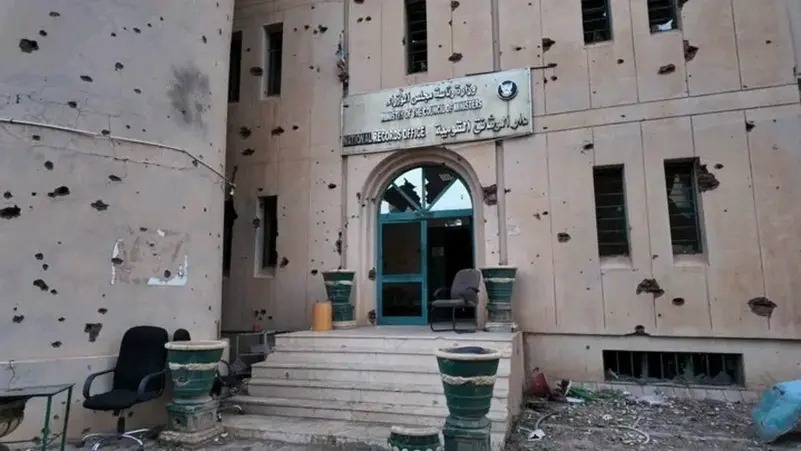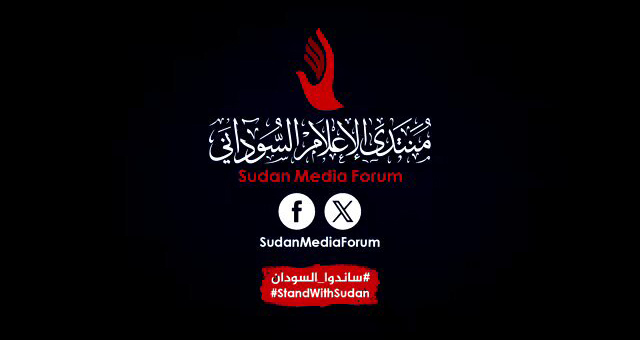As the world celebrates Artificial Intelligence, Sudanese journalism loses memory in war

The effects of the war appear on the front façade of the headquarters of the Sudanese Archives in Khartoum (Photo: Sudan Media Forum)
Prepared by Al-Alaq Centre for Press Services for Sudan Media Forum
As the world moves towards the adoption of artificial intelligence and its applications in various fields, including the development of journalistic work, the Sudanese press is facing a different and tragic reality. The country of Sudan has turned into a fierce battlefield, not only threatening the lives of journalists with death and detention but also extending to and destroying a press archive built with patience and perseverance over decades, leaving behind a huge void in the collective memory of the country.
This archive, which includes a valuable asset of sources and editorial materials, is a witness to Sudan’s modern history, but today it faces the eternal danger of being lost in the absence of a culture of electronic archiving, whether on a personal or institutional level.
A bitter reality for the Sudanese press:
As journalists around the world look to take advantage of AI, their counterparts in Sudan find themselves facing existential risks. Human rights and media reports, such as recent reports from the Sudanese Journalists Syndicate and Reporters Without Borders, reveal the scale of the disaster:
More than 400 journalists fled to neighbouring countries.
At least 31 journalists working in the media field were killed by the various parties to the conflict.
Detaining at least 17 others because of the nature of their work.
At least a dozen independent Sudanese media outlets have emerged in exile, mostly online news websites trying to continue operating in extremely difficult conditions.
Destruction of institutional memory:
The devastating effects of the war have not only affected individuals, but also on prestigious press and media institutions, causing enormous damage to their priceless archives. This included the systematic destruction of memory:
Newspaper headquarters: They were looted and vandalized, resulting in the loss of paper and electronic archives.
National Archives: It is the main repository of the memory of the Sudanese state.
Sudanese Radio Archive: which includes a recording of a long history of radio broadcasting and cultural production.
This destruction reveals not only the brutality of war, but also a long-standing neglect of the importance of digital archiving and the use of technical advances to preserve documents and archives. This neglect threatens to lose a history that could have been documented for the present and built upon for the future.
Live testimonies of loss:
In this report, we review the testimonies of Sudanese women journalists who have lost a precious part of their professional and personal memory. They seemed deeply saddened as they recounted how the effort of many years of work, archiving and documenting was destroyed in moments:
Hawa Rahma (journalist): “What media professionals have lost is priceless. We’re talking about rare newspapers, archives of think tanks, and materials that are difficult to recover. Before the war, archiving was done in a traditional way, which exposed it to factors of damage and neglect, and the war came to make matters worse. Rare information and works related to important stages in Sudan’s history, including sensitive files on corruption and abuses, have been destroyed. On a personal level, I lost my archives to more than one newspaper I worked for and thus lost a large part of my history as a journalist. Since archiving was not safe and the headquarters were vandalized, it became difficult to recover those materials that I had worked on for years. I feel like I’ve lost a part of me. Even information stored in social media may put its owner at risk. In my opinion, the loss of this information may be deliberate, and related to what happened during the era and history of the Salvation Government, and some of it is related to serious crimes such as corruption, violations, and the issue of dispersing the sit-in.”
Amira Mahjoub (Journalist in the Archiving Department at Al-Alqa Centre): “As a journalist, I can say that I lost a rich and precious archive. We have made a great effort at Al-Alaq Centre to document and archive press materials, topics and issues published in a number of newspapers during the period (2003-2022). This archive served as a rich reference for students of science and journalists. With the help of a team, she also documented and archived 4,328 clippings by converting them from paper to electronic. The library also included rare volumes that reflect the essence of journalistic work, including a volume for the prestigious newspaper Al-Midan, another dedicated to issues of people with disabilities, and a volume that was under preparation for “Hawa’s Agenda”, the famous page of the newspaper Al-Ayyam (2000-2016). All these data, some of which were collected from the Archives and classified at the Centre, as well as working papers covering the Centre’s activities from its establishment in 2007 until 2023, were lost due to the looting of the headquarters after the outbreak of the war. The culture of electronic archiving is absent from our personal and institutional behaviour.”
Somaya Al-Tabji (journalist who worked for Al-Ayyam newspaper and a number of newspapers): I have already lost my journalistic archive after a strenuous effort in classifying and classifying various materials that spanned more than twenty years. It was a huge loss of professional and historical effort and memory. The loss of a journalist to his archives is not only a personal loss, but a loss for society as a whole. The archive contained political, economic, and social events, and represented visions of various segments of society in various historical circumstances and stages. I consider it an important cumulative reference for a particular event, issue, or phenomenon. Its loss represents the loss of accumulated memory of events, effort, and documentation, which can help to read, analyse, or even cite when applying for new work. It’s like losing a child I was caring for and growing in my hands. This leads directly to the importance of electronic archiving that we lack in our behaviour at the private and institutional level. The need to pay attention to electronic archiving, especially for print newspapers, must be reconsidered. I started archiving electronically, and even though it was just beginning, I was able to keep some of the work.”
Mashaer Ramadan Hussain (journalist and human rights defender): “My journalistic archive is an emotional form… She worked for Al-Ayyam newspaper and progressed from editor and head of department to editorial secretary. Prior to that, I worked as a collaborator with a number of newspapers during my university studies. These experiences gave me nearly ten years of practical experience in print journalism, as well as working on websites and in addition to working in civil society at the Al-Ayyam and Al-Alaq centres for press services. This experience added to my professional and practical balance and formed a balance of sources and bodies as a reference, and I have a documented archive of press materials, scientific papers, some research, and self-writings. By the nature of my work in the editorial secretariat of Al-Ayyam, I had an archive of the newspaper’s preparation materials, some of which were handwritten by journalistic and literary figures, headed by Mr. Mahjoub Muhammad Saleh and Mr. Al-Sir Makki, to name a few. In addition to daily editing charts, business agendas, newspaper tab, and page design templates. Besides, I had another electronic archive on my home computer containing editorial materials, articles, and correspondence for readers and friends of Al-Ayyam.
These years were an integral part of my life, shaping my conscience and the memory of my journalistic work. They are the details of my daily life, such as planting it and working hard to protect it from the weather and from the hands of others, for fear of vandalism and the death of those bushes that I planted with hard work and patience. The excessive sense of security made me keep this archive, both electronic and paper, in our house, as a valuable collectible and treasure. Every scrap of paper has a story, even some hastily written letters reminded me of stressful working days and difficult moments.
War came, uprooting the sense of security, defeating every fixed value, and displacing that precious implant and making it easy in exchange for the safety of lives. We fled to another land, and it remains in the memory of the head – insecure with the passage of days and years – that there is, on that scorched earth, an archive created with patience and fortitude; a balance of sources, editorial materials, studies, event papers, workshops and research. There is a copy of a newspaper with my first published news, there is joy and documentation in this archive, there is the first report I wrote, the first investigation, the first interview I had, and the first page I prepared. There’s a red agenda with minutes of editorial meetings, and a tribute to the managing editor’s handwriting with my Friday news coverage.
There’s a lot: a voice recorder, my phone’s camera, a design device, and another phone with the phone numbers of all the sources I’ve dealt with. In that war-scorched earth, we left a lot behind… Will it hold? Will return be easy until we get back some of what we lost? I do not think it is possible to recover a large part of the paper archive; I am now working to restore part of my network of sources and some of the writers and readers of Al-Ayyam newspaper, with a new memory and from a different land, until I return, dig up and search for a journalist who was destroyed by the war.”
Amina Al-Nour (radio director and vice president of the drama department): “A book in print and dramatic texts that tell my career… The National Radio in Omdurman was one of the first institutions to be completely occupied by the Rapid Support Forces, by virtue of their previous presence in its guard. This ancient institution, including its precious library, has been lost. I lost my personal library, which contained studies, research papers, critical writings, and novels, and was a help in my work in fields related to media and radio drama. Also, I lost a book in print about radio drama that was in one of the printing presses that burned to the ground. In addition to an archive containing analyses of dramatic scripts, both produced and in production. Not to mention the various works that I worked on producing during my career as a radio director, including programs, drama evenings and series, which were preserved on radio servers whose fate we do not know.”
These testimonies show the magnitude of the tragedy that befell the Sudanese press and its memory. The loss of these archives is not only a loss for journalists and their owners, but a loss for the entire Sudan, a loss of a vital part of its history and identity. This tragedy underscores the urgent need to adopt a culture of digital archiving and to protect the collective memory of nations, especially in times of conflict and crisis. Is it possible to catch up and start building a digital archive that will withstand challenges and preserve for future generations their legacy and history?

This report is prepared by Al-Alaq Centre for Press Services and published via the platforms of Sudan Media Forum member organisations to shed light on the situation of journalism and journalists in Sudan.
#SilenceKills #الصمت_يقتل #NoTimeToWasteForSudan #الوضع_في_السودان_لايحتمل_التأجيل #StandWithSudan #ساندوا_السودان #SudanMediaForum #PressFreedom #AI #ArtificialIntelligence











 and then
and then